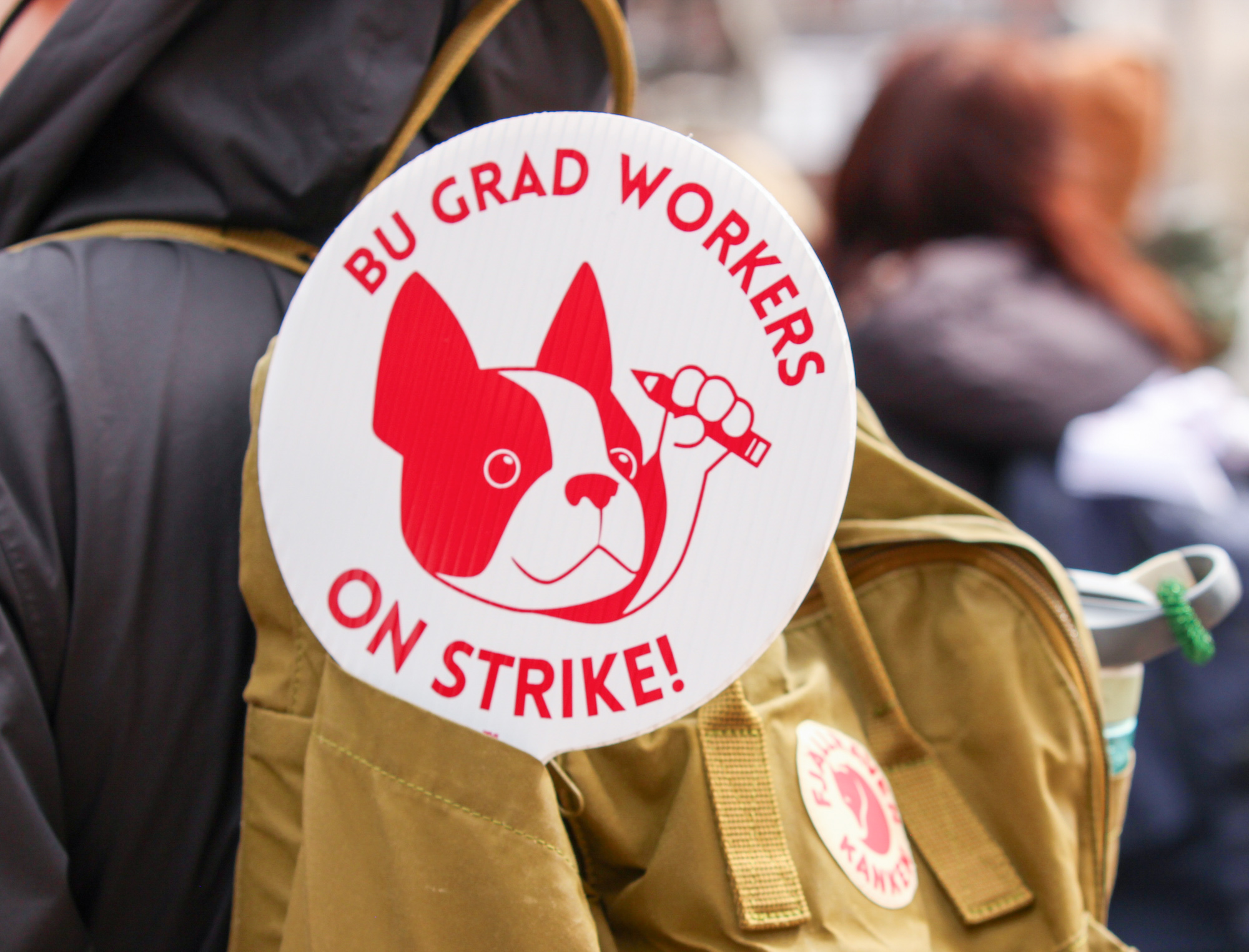See more Daily Free Press coverage of the BUGWU strike here.
Students, professors and graduate workers expressed discontent with Boston University after the dean of the College of Arts and Sciences suggested the use of generative artificial intelligence tools to replace striking graduate teaching assistants. The BU Graduate Workers Union has been on strike since last week.
CAS Dean Stan Sclaroff sent an email to his colleagues on March 27 suggesting the use of generative AI tools in discussion sections to replace striking graduate teaching assistants participating in the BUGWU strike. The email was obtained and verified by The Daily Free Press.

“Given the circumstances and the need to support our students’ continued learning, these options may be employed. Below, we have listed some creative ways in which, we have heard, some faculty are adapting their course formats and using technology to serve their students,” Sclaroff wrote in the email.
Sclaroff suggested that discussion sections be professors combined over Zoom, assign readings and ask students to write reflections on them, consider alternative assignments, use the BlackBoard discussion board feature and “engage generative AI tools to give feedback or facilitate ‘discussion’ on readings or assignments.”
Thomas Possidente, a first-year PhD student, described the suggestion as “comical” since it is a “misunderstanding of what AI can and can’t do.”
“[The suggestion is] driven by a lot of corporate ideals that AI can fix everything, which is misplaced and also is disrespectful to the grad workers that work hard to know their subject area very well,” he said.
In an email, BU spokesperson Colin Riley denied the university is planning on replacing graduate student teaching assistants is “patently false” and that discussion groups will continue to be led by teaching assistants.
“What Dean Sclaroff is advocating in his memo is that in cases where some discussion groups have been affected by the union’s job action, professors should consider a wide range of teaching tools available to them to offset the absence of a striking teaching assistant, and using technology, including generative AI, as a part of discussion group activities is one of about a dozen possibilities that have been used in classroom settings,” he wrote.
Cameron Edgar, the BUGWU Mathematics and Statistics representative, said there is “extreme sense of disappointment” from himself and “pretty much every other graduate worker or individual” he has spoken with.
“The best learning experiences I’ve ever had always stemmed from establishing real human connections between educators and students,” Edgar said. “The dean’s suggestion to replace individualized feedback … with generative AI is an outright rejection of our value to the university as both workers and human beings.”
SEIU Local 509, the union that is representing BUGWU in negotiations with the university, released a statement on March 29 stating they were “extremely disappointed” by the university’s suggestion that “the use of AI could even begin to supplement the hard work that graduate workers pour into mentoring students, facilitating discussions, and teaching.”
Faculty and staff at BU have expressed their support for the BUGWU strike, even creating a petition to change a university policy that would require professors to report graduate workers who are striking.
Professors were not pleased that the use of AI was suggested to replace graduate workers in the discussion sections and labs of classes they teach.
Nathan Phillips, a professor of earth and environment, said they were “disturbed by the suggestion” and will not follow the suggestion, as they believe AI does not provide an “authentic education.”
“Education is more than just transmittal of information,” Phillips said. “It’s about being in a community of learners and teachers and that suggestion is the antithesis of everything that the concept of education stands for.”
Lida Maxwell, a professor of political science and women’s, gender and sexuality studies, would not substitute graduate teaching assistants with AI, because she would “like to respect what [the graduate workers] are doing with the strike.”
“Regardless of [BU administration’s] intent, it’s probably not useful to push us in that direction,” Maxwell said. “It degrades your education.”
Undergraduate students have also expressed frustrations at the university’s suggestion to use AI.
Ellie Winkler Quigley, a freshman in the College of Arts and Sciences, is concerned about the inability to form personal relationships with her teaching assistants if the switch to AI tools were to take place.
“With the TA, you’re able to connect with them,” Winkler Quigley said. “With AI, that completely takes away the ability to connect with people and that just puts everything on a computerized level.”
Students are also concerned with the inability to receive human feedback and comments on their work.
Vijay Fisch, a sophomore in the Center for Computing and Data Science, said that the suggestion to use AI in the classroom is “absurd” since AI will never reach the high level of writing that BU graduate workers have.
“There’s a human element of having your grad worker give you advice on a piece of work, that AI can’t do, that is just essential for learning to be productive,” he said.
Edgar also commented on the potential plagiarism issues if AI-generated systems became a major aspect of discussion classes.
“The administration as a whole would consider AI-generated student work to be a massive violation of its own academic code of conduct,” he said. “Why then is it acceptable for you to charge $90,000 a year, just to effectively give students plagiarized feedback?”
Campus Co-Editor Maya Mitchell contributed to this article.






















































































































